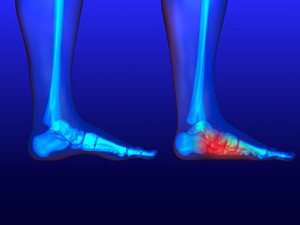Causes and Symptoms of Flat Feet
Monday, 25 February 2019 00:00 Fallen arches, which is also referred to as flat feet, occurs when the arch is absent from the foot. This can be noticed when the foot lies completely flat on the floor while standing. The foot may roll inward while walking, and this may affect the gait. The purpose of the arch is to help in distributing weight across the feet, which is the foundation of the body. Some patients do not experience symptoms with flat feet, and some people may feel pain as stress is put on the muscles and ligaments. A symptom may include swollen feet where the arch would generally be, and shoes may wear unevenly on one side. Foot or ankle injuries may cause this condition, in addition to predisposed genetic traits. Obesity and pregnancy may play a significant role in developing flat feet, and age may deteriorate the tendon, which supports the arch. If you feel you have this condition, it is advised to speak to a podiatrist who can offer proper treatment options.
Fallen arches, which is also referred to as flat feet, occurs when the arch is absent from the foot. This can be noticed when the foot lies completely flat on the floor while standing. The foot may roll inward while walking, and this may affect the gait. The purpose of the arch is to help in distributing weight across the feet, which is the foundation of the body. Some patients do not experience symptoms with flat feet, and some people may feel pain as stress is put on the muscles and ligaments. A symptom may include swollen feet where the arch would generally be, and shoes may wear unevenly on one side. Foot or ankle injuries may cause this condition, in addition to predisposed genetic traits. Obesity and pregnancy may play a significant role in developing flat feet, and age may deteriorate the tendon, which supports the arch. If you feel you have this condition, it is advised to speak to a podiatrist who can offer proper treatment options.
Flatfoot is a condition many people suffer from. If you have flat feet, contact Dr. Lee R. Stein from Lake Shore Foot & Ankle, PC. Our doctor will treat your foot and ankle needs.
What Are Flat Feet?
Flatfoot is a condition in which the arch of the foot is depressed and the sole of the foot is almost completely in contact with the ground. About 20-30% of the population generally has flat feet because their arches never formed during growth.
Conditions & Problems:
Having flat feet makes it difficult to run or walk because of the stress placed on the ankles.
Alignment – The general alignment of your legs can be disrupted, because the ankles move inward which can cause major discomfort.
Knees – If you have complications with your knees, flat feet can be a contributor to arthritis in that area.
Symptoms
- Pain around the heel or arch area
- Trouble standing on the tip toe
- Swelling around the inside of the ankle
- Flat look to one or both feet
- Having your shoes feel uneven when worn
Treatment
If you are experiencing pain and stress on the foot you may weaken the posterior tibial tendon, which runs around the inside of the ankle.
If you have any questions please feel free to contact one of our offices located in Chicago, Highland Park, and Uptown, IL . We offer the newest diagnostic and treatment technologies for all your foot and ankle needs.
Blog Archives
- April 2025
- March 2025
- February 2025
- January 2025
- December 2024
- November 2024
- October 2024
- September 2024
- August 2024
- July 2024
- June 2024
- May 2024
- April 2024
- March 2024
- February 2024
- January 2024
- December 2023
- November 2023
- October 2023
- September 2023
- August 2023
- July 2023
- June 2023
- May 2023
- April 2023
- March 2023
- February 2023
- January 2023
- December 2022
- November 2022
- October 2022
- September 2022
- August 2022
- July 2022
- June 2022
- May 2022
- April 2022
- March 2022
- February 2022
- January 2022
- December 2021
- November 2021
- October 2021
- September 2021
- August 2021
- July 2021
- June 2021
- May 2021
- April 2021
- March 2021
- February 2021
- January 2021
- December 2020
- November 2020
- October 2020
- September 2020
- August 2020
- July 2020
- June 2020
- May 2020
- April 2020
- March 2020
- February 2020
- January 2020
- December 2019
- November 2019
- October 2019
- September 2019
- August 2019
- July 2019
- June 2019
- May 2019
- April 2019
- March 2019
- February 2019
- January 2019
- December 2018
- November 2018
- October 2018
- September 2018
- August 2018
- July 2018







